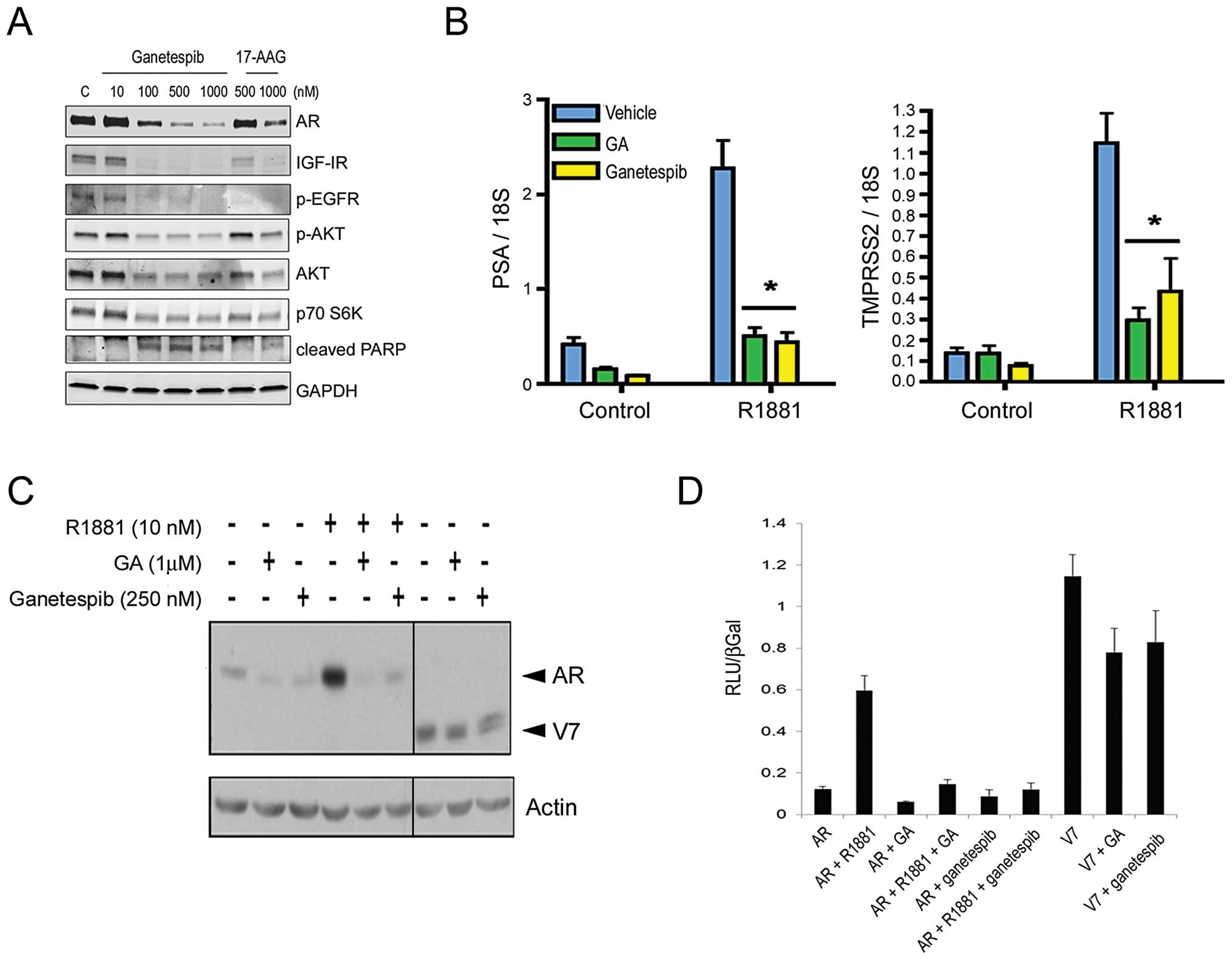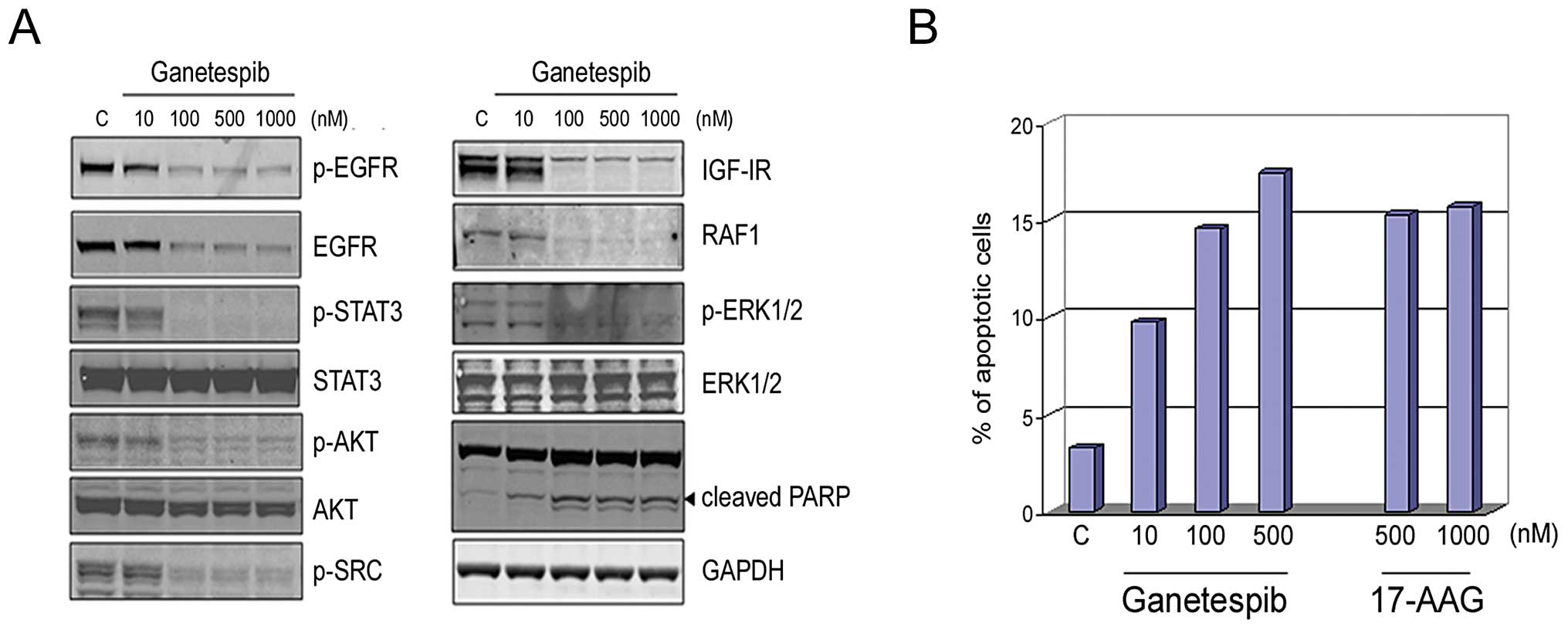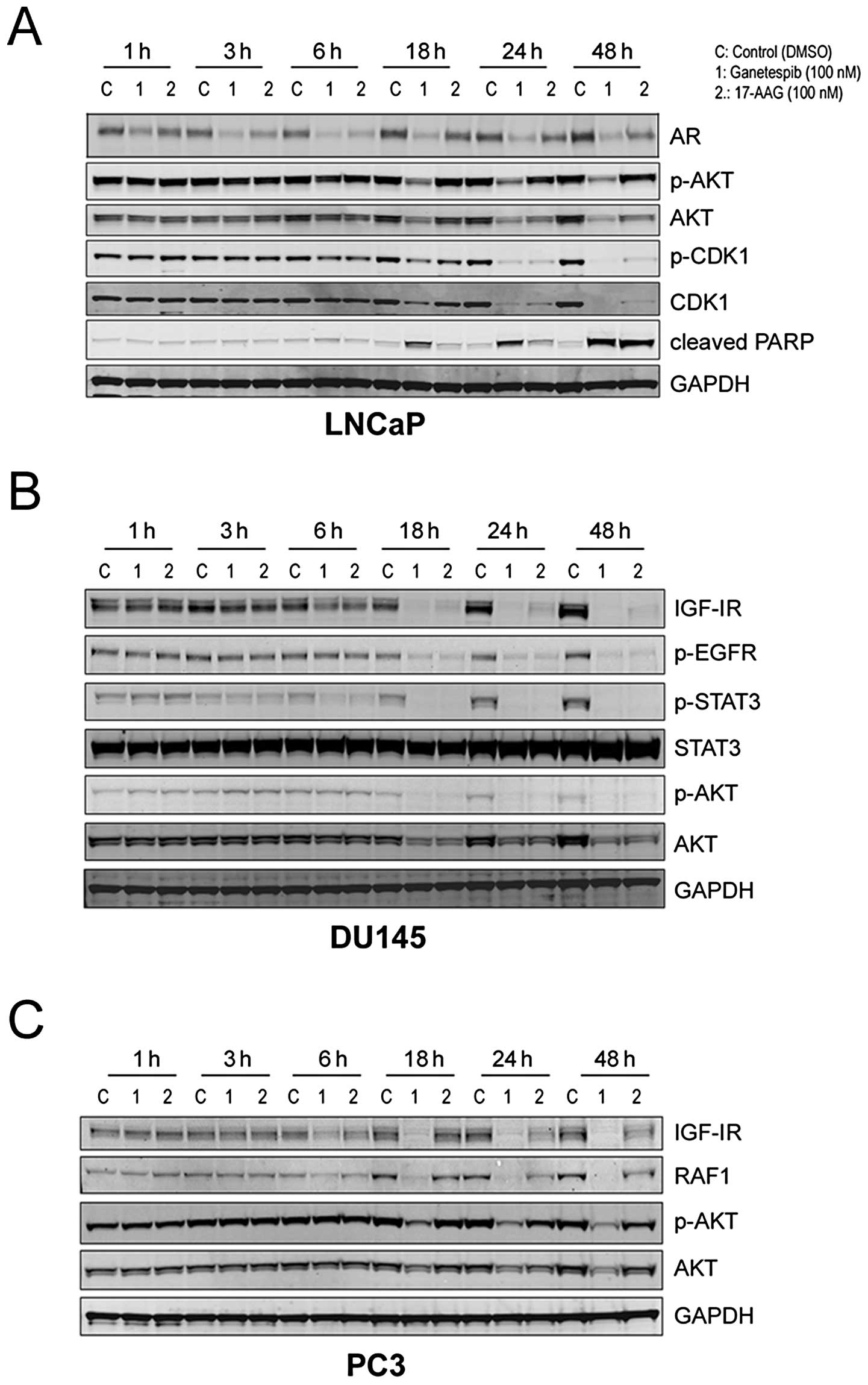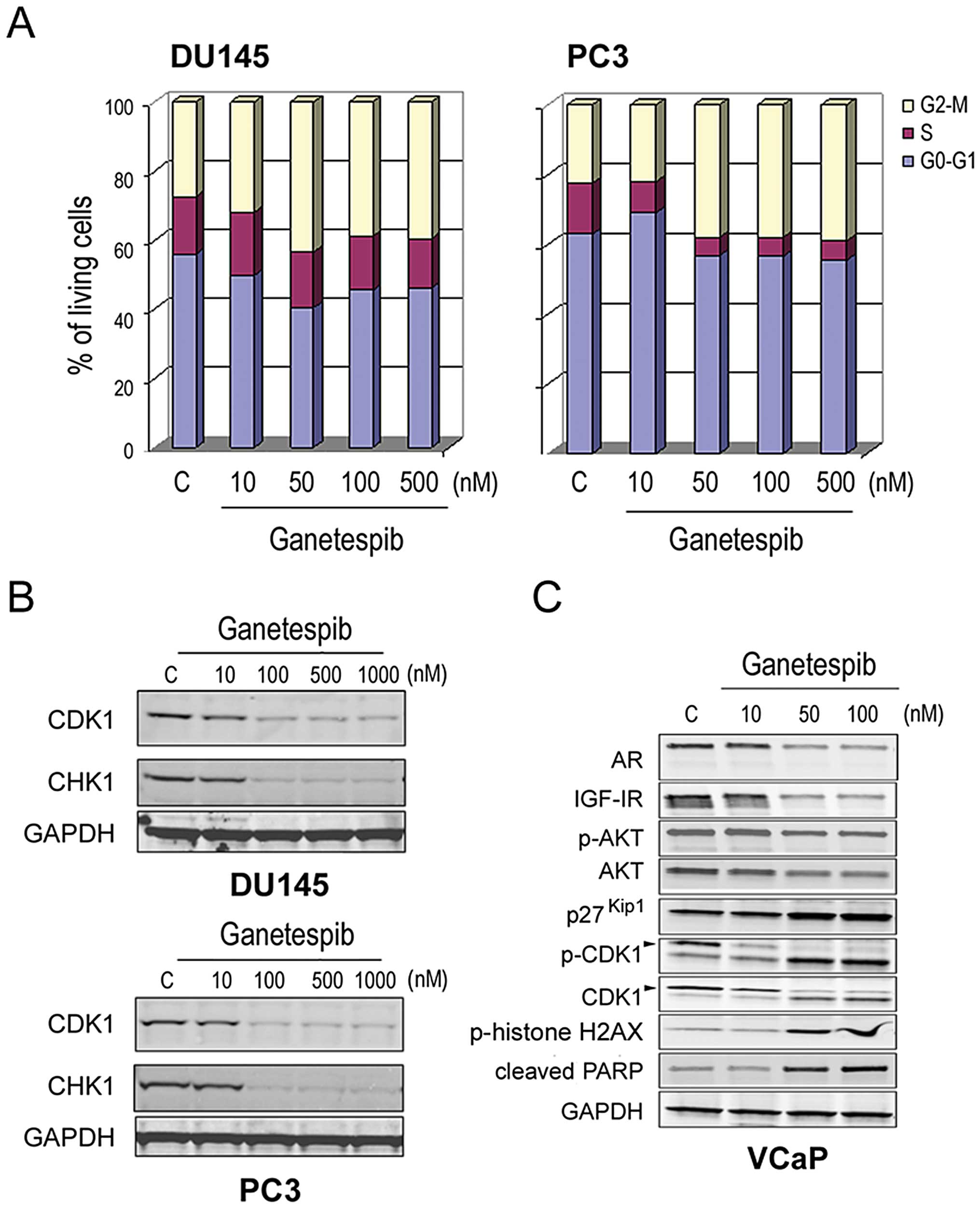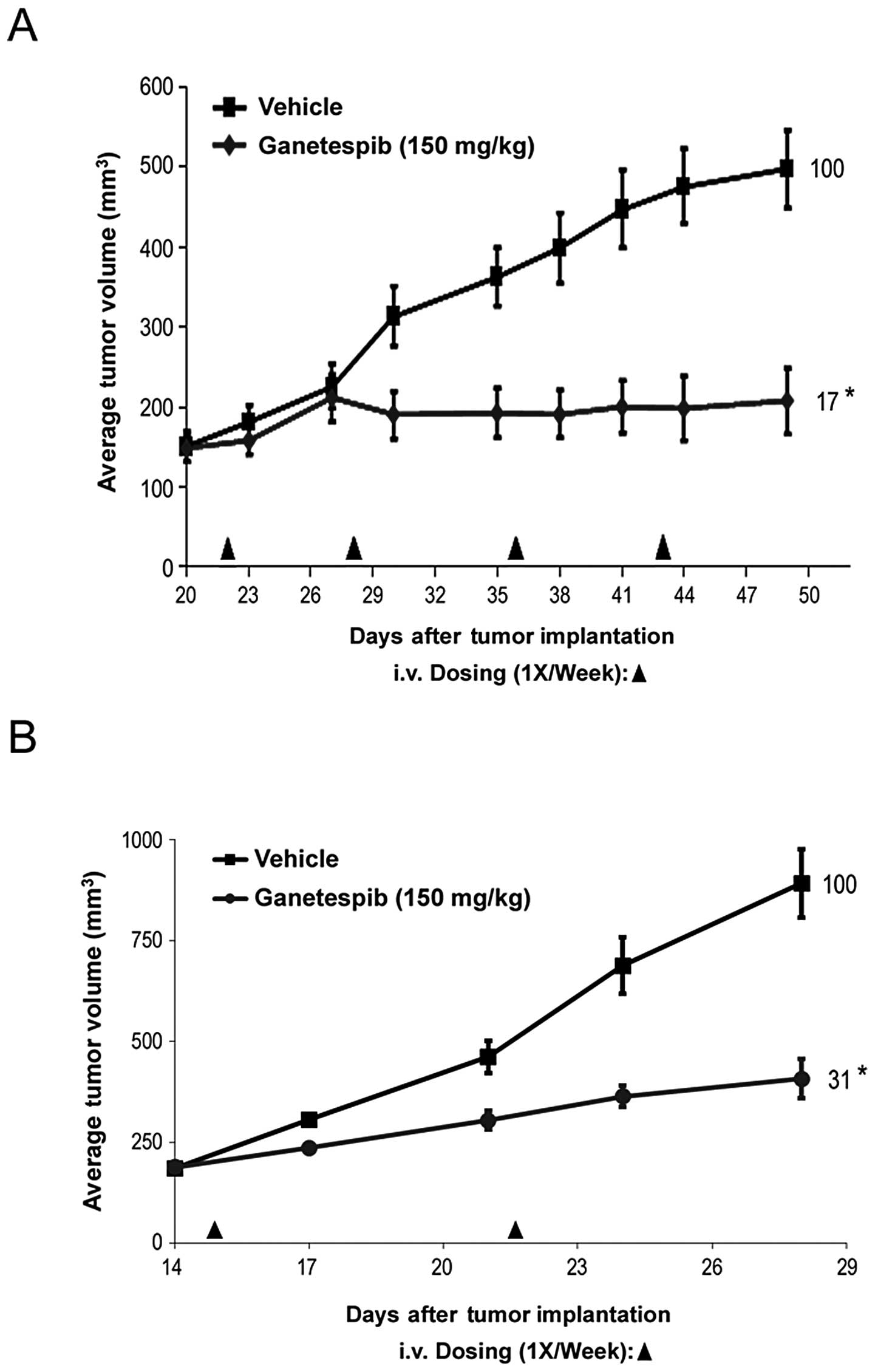|
1.
|
Jemal A, Siegel R, Xu J, et al: Cancer
statistics, 2010. CA Cancer J Clin. 60:277–300. 2010. View Article : Google Scholar
|
|
2.
|
Balk SP and Knudsen KE: AR, the cell
cycle, and prostate cancer. Nucl Recept Signal.
6:e0012008.PubMed/NCBI
|
|
3.
|
Chen Y, Sawyers CL and Scher HI: Targeting
the androgen receptor pathway in prostate cancer. Curr Opin
Pharmacol. 8:440–448. 2008. View Article : Google Scholar : PubMed/NCBI
|
|
4.
|
Scher HI, Buchanan G, Gerald W, et al:
Targeting the androgen receptor: improving outcomes for
castration-resistant prostate cancer. Endocr Relat Cancer.
11:459–476. 2004. View Article : Google Scholar : PubMed/NCBI
|
|
5.
|
Lonergan PE and Tindall DJ: Androgen
receptor signaling in prostate cancer development and progression.
J Carcinog. 10:202011. View Article : Google Scholar : PubMed/NCBI
|
|
6.
|
Yap TA, Zivi A, Omlin A and De Bono JS:
The changing therapeutic landscape of castration-resistant prostate
cancer. Nat Rev Clin Oncol. 8:597–610. 2011. View Article : Google Scholar : PubMed/NCBI
|
|
7.
|
Osanto S and van Poppel H: Emerging novel
therapies for advanced prostate cancer. Ther Adv Urol. 4:3–12.
2012. View Article : Google Scholar
|
|
8.
|
Attard G, Cooper CS and De Bono JS:
Steroid hormone receptors in prostate cancer: a hard habit to
break? Cancer Cell. 16:458–462. 2009. View Article : Google Scholar : PubMed/NCBI
|
|
9.
|
Hahn JS: The Hsp90 chaperone machinery:
from structure to drug development. BMB Rep. 42:623–630. 2009.
View Article : Google Scholar : PubMed/NCBI
|
|
10.
|
Whitesell L and Lindquist SL: HSP90 and
the chaperoning of cancer. Nat Rev Cancer. 5:761–772. 2005.
View Article : Google Scholar : PubMed/NCBI
|
|
11.
|
Saporita AJ, Ai J and Wang Z: The Hsp90
inhibitor, 17-AAG, prevents the ligand-independent nuclear
localization of androgen receptor in refractory prostate cancer
cells. Prostate. 67:509–520. 2007. View Article : Google Scholar : PubMed/NCBI
|
|
12.
|
Trepel J, Mollapour M, Giaccone G, et al:
Targeting the dynamic HSP90 complex in cancer. Nat Rev Cancer.
10:537–549. 2010. View
Article : Google Scholar : PubMed/NCBI
|
|
13.
|
Vanaja DK, Mitchell SH, Toft DO, et al:
Effect of geldanamycin on androgen receptor function and stability.
Cell Stress Chaperones. 7:55–64. 2002. View Article : Google Scholar : PubMed/NCBI
|
|
14.
|
Pratt WB and Toft DO: Steroid receptor
interactions with heat shock protein and immunophilin chaperones.
Endocr Rev. 18:306–360. 1997.PubMed/NCBI
|
|
15.
|
Banerji U: Heat shock protein 90 as a drug
target: some like it hot. Clin Cancer Res. 15:9–14. 2009.
View Article : Google Scholar : PubMed/NCBI
|
|
16.
|
Neckers L: Heat shock protein 90: the
cancer chaperone. J Biosci. 32:517–530. 2007. View Article : Google Scholar : PubMed/NCBI
|
|
17.
|
Xu W and Neckers L: Targeting the
molecular chaperone heat shock protein 90 provides a multifaceted
effect on diverse cell signaling pathways of cancer cells. Clin
Cancer Res. 13:1625–1629. 2007. View Article : Google Scholar : PubMed/NCBI
|
|
18.
|
Li Y, Zhang T, Schwartz SJ and Sun D: New
developments in Hsp90 inhibitors as anti-cancer therapeutics:
mechanisms, clinical perspective and more potential. Drug Resist
Updat. 12:17–27. 2009. View Article : Google Scholar : PubMed/NCBI
|
|
19.
|
Taldone T, Gozman A, Maharaj R, et al:
Targeting Hsp90: small-molecule inhibitors and their clinical
development. Curr Opin Pharmacol. 8:370–374. 2008. View Article : Google Scholar : PubMed/NCBI
|
|
20.
|
Eskew JD, Sadikot T, Morales P, et al:
Development and characterization of a novel C-terminal inhibitor of
Hsp90 in androgen dependent and independent prostate cancer cells.
BMC Cancer. 11:4682011. View Article : Google Scholar : PubMed/NCBI
|
|
21.
|
Lamoureux F, Thomas C, Yin MJ, et al: A
novel HSP90 inhibitor delays castrate-resistant prostate cancer
without altering serum PSA levels and inhibits osteoclastogenesis.
Clin Cancer Res. 17:2301–2313. 2011. View Article : Google Scholar
|
|
22.
|
O’Malley KJ, Langmann G, Ai J, et al:
Hsp90 inhibitor 17-AAG inhibits progression of LuCaP35 xenograft
prostate tumors to castration resistance. Prostate. 72:1117–1123.
2011.PubMed/NCBI
|
|
23.
|
Solit DB, Zheng FF, Drobnjak M, et al:
17-Allylamino-17-demethoxygeldanamycin induces the degradation of
androgen receptor and HER-2/neu and inhibits the growth of prostate
cancer xenografts. Clin Cancer Res. 8:986–993. 2002.PubMed/NCBI
|
|
24.
|
Heath EI, Hillman DW, Vaishampayan U, et
al: A phase II trial of 17-allylamino-17-demethoxygeldanamycin in
patients with hormone-refractory metastatic prostate cancer. Clin
Cancer Res. 14:7940–7946. 2008. View Article : Google Scholar : PubMed/NCBI
|
|
25.
|
Oh WK, Galsky MD, Stadler WM, et al:
Multicenter phase II trial of the heat shock protein 90 inhibitor,
retaspimycin hydro-chloride (IPI-504), in patients with
castration-resistant prostate cancer. Urology. 78:626–630. 2011.
View Article : Google Scholar : PubMed/NCBI
|
|
26.
|
Ying W, Du Z, Sun L, et al: Ganetespib, a
unique triazolone-containing hsp90 inhibitor, exhibits potent
antitumor activity and a superior safety profile for cancer
therapy. Mol Cancer Ther. 11:475–484. 2012. View Article : Google Scholar : PubMed/NCBI
|
|
27.
|
Nazareth LV, Stenoien DL, Bingman WE, et
al: A C619Y mutation in the human androgen receptor causes
inactivation and mislocalization of the receptor with concomitant
sequestration of SRC-1 (steroid receptor coactivator 1). Mol
Endocrinol. 13:2065–2075. 1999. View Article : Google Scholar
|
|
28.
|
Agoulnik IU, Vaid A, Nakka M, et al:
Androgens modulate expression of transcription intermediary factor
2, an androgen receptor coactivator whose expression level
correlates with early biochemical recurrence in prostate cancer.
Cancer Res. 66:10594–10602. 2006. View Article : Google Scholar
|
|
29.
|
Nazareth LV and Weigel NL: Activation of
the human androgen receptor through a protein kinase A signaling
pathway. J Biol Chem. 271:19900–19907. 1996. View Article : Google Scholar : PubMed/NCBI
|
|
30.
|
Agoulnik IU, Krause WC, Bingman WE, et al:
Repressors of androgen and progesterone receptor action. J Biol
Chem. 278:31136–31148. 2003. View Article : Google Scholar : PubMed/NCBI
|
|
31.
|
Proia DA, Foley KP, Korbut T, et al:
Multifaceted intervention by the Hsp90 inhibitor ganetespib
(STA-9090) in cancer cells with activated JAK/STAT signaling. PLoS
One. 6:e185522011. View Article : Google Scholar : PubMed/NCBI
|
|
32.
|
Dehm SM, Schmidt LJ, Heemers HV, et al:
Splicing of a novel androgen receptor exon generates a
constitutively active androgen receptor that mediates prostate
cancer therapy resistance. Cancer Res. 68:5469–5477. 2008.
View Article : Google Scholar : PubMed/NCBI
|
|
33.
|
Hu R, Dunn TA, Wei S, et al:
Ligand-independent androgen receptor variants derived from splicing
of cryptic exons signify hormone-refractory prostate cancer. Cancer
Res. 69:16–22. 2009. View Article : Google Scholar : PubMed/NCBI
|
|
34.
|
Li Y, Alsagabi M, Fan D, et al: Intragenic
rearrangement and altered RNA splicing of the androgen receptor in
a cell-based model of prostate cancer progression. Cancer Res.
71:2108–2117. 2011. View Article : Google Scholar : PubMed/NCBI
|
|
35.
|
Connolly JM and Rose DP: Autocrine
regulation of DU145 human prostate cancer cell growth by epidermal
growth factor-related polypeptides. Prostate. 19:173–180. 1991.
View Article : Google Scholar : PubMed/NCBI
|
|
36.
|
Okamoto M, Lee C and Oyasu R:
Interleukin-6 as a paracrine and autocrine growth factor in human
prostatic carcinoma cells in vitro. Cancer Res. 57:141–146.
1997.PubMed/NCBI
|
|
37.
|
Fang Z, Zhang T, Dizeyi N, et al: Androgen
receptor enhances p27 degradation in prostate cancer cells through
rapid and selective TRC2 activation. J Biol Chem. 287:2090–2098.
2011. View Article : Google Scholar : PubMed/NCBI
|
|
38.
|
Huggins C, Stevens RE and Hodges CV:
Studies on prostatic cancer. II. The effect of castration on
advanced carcinoma of the prostate gland. Arch Surg. 43:209–228.
1941. View Article : Google Scholar
|
|
39.
|
Sartor O, Michels RM, Massard C, et al:
Novel therapeutic strategies for metastatic prostate cancer in the
post-docetaxel setting. Oncologist. 16:1487–1497. 2011. View Article : Google Scholar : PubMed/NCBI
|
|
40.
|
Kim YS, Alarcon SV, Lee S, et al: Update
on Hsp90 inhibitors in clinical trial. Curr Top Med Chem.
9:1479–1492. 2009. View Article : Google Scholar : PubMed/NCBI
|
|
41.
|
Proia DA, Sang J, He S, et al: Synergistic
activity of the Hsp90 inhibitor ganetespib with taxanes in
non-small cell lung cancer models. Invest New Drugs. View Article : Google Scholar : [Epub ahead of
print]. 2012.PubMed/NCBI
|
|
42.
|
Smith DF and Toft DO: Minireview: the
intersection of steroid receptors with molecular chaperones:
observations and questions. Mol Endocrinol. 22:2229–2240. 2008.
View Article : Google Scholar : PubMed/NCBI
|
|
43.
|
Monti S, Proietti-Pannunzi L, Sciarra A,
et al: The IGF axis in prostate cancer. Curr Pharm Des. 13:719–727.
2007. View Article : Google Scholar : PubMed/NCBI
|
|
44.
|
Ozkan EE: Plasma and tissue insulin-like
growth factor-I receptor (IGF-IR) as a prognostic marker for
prostate cancer and anti-IGF-IR agents as novel therapeutic
strategy for refractory cases: a review. Mol Cell Endocrinol.
344:1–24. 2011. View Article : Google Scholar
|
|
45.
|
Guo Z, Yang X, Sun F, et al: A novel
androgen receptor splice variant is up-regulated during prostate
cancer progression and promotes androgen depletion-resistant
growth. Cancer Res. 69:2305–2313. 2009. View Article : Google Scholar
|
|
46.
|
Hwang M, Moretti L and Lu B: HSP90
inhibitors: multi-targeted antitumor effects and novel
combinatorial therapeutic approaches in cancer therapy. Curr Med
Chem. 16:3081–3092. 2009. View Article : Google Scholar : PubMed/NCBI
|
|
47.
|
Solit DB and Chiosis G: Development and
application of Hsp90 inhibitors. Drug Discov Today. 13:38–43. 2008.
View Article : Google Scholar : PubMed/NCBI
|
|
48.
|
Arlander SJ, Eapen AK, Vroman BT, et al:
Hsp90 inhibition depletes Chk1 and sensitizes tumor cells to
replication stress. J Biol Chem. 278:52572–52577. 2003. View Article : Google Scholar : PubMed/NCBI
|
|
49.
|
Flatten K, Dai NT, Vroman BT, et al: The
role of checkpoint kinase 1 in sensitivity to topoisomerase I
poisons. J Biol Chem. 280:14349–14355. 2005. View Article : Google Scholar : PubMed/NCBI
|
|
50.
|
Munster PN, Basso A, Solit D, et al:
Modulation of Hsp90 function by ansamycins sensitizes breast cancer
cells to chemotherapy-induced apoptosis in an RB- and
schedule-dependent manner. Clin Cancer Res. 7:2228–2236. 2001.
|
|
51.
|
Lange BM, Bachi A, Wilm M, et al: Hsp90 is
a core centrosomal component and is required at different stages of
the centrosome cycle in Drosophila and vertebrates. EMBO J.
19:1252–1262. 2000. View Article : Google Scholar : PubMed/NCBI
|
|
52.
|
De Carcer G: Heat shock protein 90
regulates the metaphaseanaphase transition in a polo-like
kinase-dependent manner. Cancer Res. 64:5106–5112. 2004.PubMed/NCBI
|















